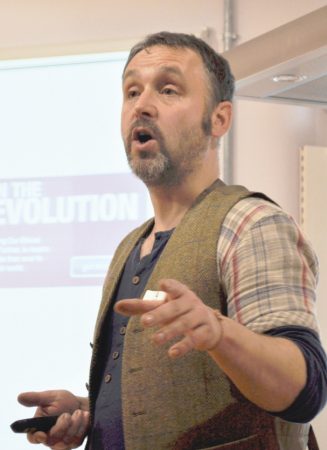Co-operative development bodies can work with councils to double the size of co-op economy, said Mark Simmonds at the 2019 Co-operative Councils Innovation Network (CCIN) conference.
Mr Simmonds, from Co-op Culture and Principle 6, ran a workshop on how co-operative development bodies (CDBs) could help councils achieve the aim of doubling the size of the co-operative economy. This aspiration has been voiced in several places, he said, including in Co-operatives UK’s National Co-operative Development Strategy (NCDS), the Co-ops Unleashed report produced by the New Economics Foundation for the Co-op Party, and from shadow chancellor John McDonnell.
In the 1980s there were 140 co-operative development agencies (CDAs), many of which worked in partnership with and were funded by local authorities – and which had a strong focus on worker co-ops. Today there are just five CDAs, and these have largely been replaced by independent co-operative development bodies (CDBs).
“There are 57 CDBs in the UK,” said Mr Simmonds, “but there are big areas where there is little support.”

Co-operative Development Scotland and the Wales Co-operative Centre work across their regions, but there are still ‘development deserts’.” Based near Hebden Bridge, Mr Simmonds often delivers development work in London, where there are just two people actively working in co-op development.
CDB workers are often self-employed and most often work with start-up co-ops, usually a group of ppl with an idea, opportunity or asset – or where a service is being withdrawn or there is a gap in the market. They help set up the legal structure, look at the financial planning, marketing, social impact, community shares and networking. “It’s general business advice, with a co-op twist,” he said.
He gave examples of organisations who have benefited from co-op development advice, including the Fox and Goose pub in Hebden Bridge, the Equal Care Co-op and Outlandish, which are all based on the idea of people coming together with a similar idea and doing something about it.
John Atherton of Co-operatives UK highlighted Outlandish’s approach to procurement through its involvement with CoTech. Outlandish is a technology worker co-op with around 14 members. CoTech is a secondary co-operative of around 30 co-ops which between them have the skills, scale and capacity to bid for contracts which would otherwise be beyond their week.
“This makes it easier for businesses and councils to work with them,” said Mr Atherton. “It’s easier to work with one big organisation than with lots of microscopic ones.” Co-operatives UK is working with CoTech to transpact this concept to other areas, he added.
Mr Simmonds chairs the Co-operative Development Forum, which acts as a focal point for CDBs. “On the policy front we are looking at how we can use what we’ve got to build relationships with local authorities (LAs) – but one of the problems is that most CDBs don’t have a geographical focus. That’s where conversations with CCIN become interesting, the network can give a central focus to this.”
He highlighted how that in the past, councils have seen CDBs as a problem, but he believes this is changing. The councils in Preston, Southampton, Plymouth and Calderdale are among those already working with CDBs, but Mr Simmonds believes there is much more that can be done.
“CDBs are more than willing to participate in events where we can promote the co-op option,” he said. “We have expertise, we’re happy to talk to councillors around issues such as asset transfer and governance. It’s basically free consultancy.”
In return, CDBs would appreciate being considered if the council has resources to spend. “At least look at the co-op option,” he said, “and have links to your local CDBs or Co-operatives UK on council websites where there are already resources for business development. Help find ways for people to find co-ops.”
Other options to consider are offering discretionary rate relief for co-operatives that fit the criteria, or make access to cheap finance available for organisations such as energy co-operatives which require a lot of initial investment.
“Co-operation between co-ops, co-op development bodies and local councils is a new space,” said Mr Simmons, “but it’s a space that could have an exciting future.”